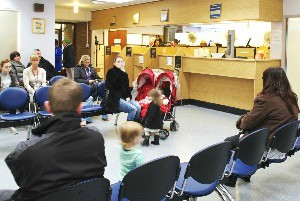Nearly 900 GP projects completed via infrastructure fund

Exclusive NHS England’s flagship infrastructure fund has financed 866 GP projects as of the end of February.
The estates and technology transformation fund, which launched as part of the plan in April 2016, will also back a further 972 schemes which are still in the pipeline.
This comes as NHS England is two years into its five-year plan to rejuvenate general practice with the GP Forward View.
However, GP leaders said some GPs are still struggling to secure funding for larger projects, suggesting NHS England’s official data reflects ‘the more rapid approval of much smaller scale projects’.
NHS England told Pulse that they are ‘on track’ to deliver the planned investment of £900m over five years up to 2020/21, adding that projects launched in 2017/18 have been focused on estates rather than technology, which was the focus of many projects launched in 2016/17.
The estates and transformation funding comes out of the £1bn primary care infrastructure fund, which was launched in 2014.
An NHS England spokesperson told Pulse: ‘We are on track to deliver the original planned investment.
‘As at 28 February 2018, 866 schemes have been completed, and there are a further 972 active schemes.’
Of those 972 projects, NHS England said 427 are going through due diligence, 170 are in the ‘pre-project’ phase and 375 are in the process of being delivered.
They added: ‘The 2017/18 estates and technology programme has seen an increased focus in estates schemes as opposed to a more technology aligned focus in 2016/17.
‘We are now seeing examples of new or extended buildings and new technology which are delivering benefits to practices and patients.’
This comes after a Pulse investigation revealed that only 5% – £48m – of the fund has been spent on premises by February 2017, with only a quarter of practices that had applied for funding receiving approval.
BMA GP Committee chair Dr Richard Vautrey said: ‘Although we welcome the increased number of projects completed and forthcoming, we’re concerned that practices who have secured approval are only receiving 65% of funding instead of the initial 100% that NHS England promised in 2016.
‘We’ve heard from GPs that there have been difficulties in securing funding for large scale projects, so the statistics may reflect the more rapid approval of much smaller scale.
The GPC negotiated an end to the 65% cap on project funding as part of changes to the premises cost directions in the 2018/19 GP contract round.
However, it was agreed that all the new terms would only be applied going forward, leaving some projects with only partial funding.
The cap had previously stopped projects from going ahead, for example in the crisis town of Bridlington where plans to develop a single building to house five GP practices were scrapped when NHS England said it could not fund the entire project.
Dr Vautrey added that a ‘fundamental review of premises arrangements is needed to remove “last partner standing” scenarios and avoid discouraging GPs from become partners’.
The GPC announced a six-month review of premises issues would start in the summer and look at whether premises are fit for purpose for the future, promoting the recruitment and retention of GP contractors and ensuring GP premises give good value for money.
What is the £1bn transformation fund?
The £250m-a-year fund was a 2014 commitment made by then chancellor George Osborne, which would address immediate capacity and access issues, and lay the foundations for delivering care in the community.
Speaking in 2015, when GP practices were first invited to bid for funding, NHS England chief executive Simon Stevens said ‘kick-starting an upgrade in primary care infrastructure is mission critical’.
But the scheme was taken back to square one in its first year with practices needing to align their plans with local estates strategies.
And Pulse has since shown that just a fraction – £48m of the £500million that was meant to be committed at this stage – has reached practices.
The need for practice premises to be fit for the 21st century was strengthened even more last year when Jeremy Hunt said he wanted general practice to become a ‘one-stop shop’ taking on outpatient care for chronic conditions.
Pulse October survey
Take our July 2025 survey to potentially win £1.000 worth of tokens












